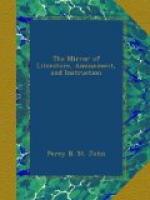In 1820, the whole iron made in Great Britain was 400,000 tons: in 1827, it had increased to 690,000 tons, from 284 furnaces. About three-tenths of this quantity are of a quality suitable for the foundry, which is all used in Great Britain and Ireland, with the exception of a small quantity exported to France and America. The other seven-tenths are made into bars, rods, sheets, &c., of which a large quantity is exported to all parts of the world.—Repertory of Arts.
Indian Claystone.
In some parts of India, the claystone contains numerous small nodules or lumps of clay iron-stone, which seldom exceed the size of a walnut. These are picked up by the natives, and are smelted by means of charcoal in a very small, rude furnace, blown by the hand-bellows, common all over India, and still used in Europe by the Gipsies. Many of the hills composed of claystone are neatly devoid of vegetation; their surface being bare and smooth, and of a red or black colour. The soil produced by the action of the atmosphere is not very productive; and so liable is it, in some places, to consolidate, when deprived of its moisture, that, if it be not constantly cultivated, it soon becomes hard and bare, and checks all vegetation.
Public Improvement.
The spirit of general improvement pervades every part of the continent, and is even more active in France than in Britain. In Britain, the spirit of improvement is chiefly evinced in public works, and in the useful arts and manufactures, and its efforts are characterized much more by superfluity of wealth than by science or refinement: in Germany this spirit is evinced in public buildings, in a superior taste, in agriculture, and education—Gard. Mag.
The Himalaya Mountains.
This vast accumulation of sublime peaks, the pinnacles of our globe, is so extensive, that a plane, resting on elevations 21,000 feet, may be stretched in one direction as far as the Hindoo Cosh, for upwards of 1,000 miles, above which rise loftier summits, increasing in height to nearly 6,000 feet more.
To make Gold Size.
Melt one pound of asphaltum, and pour into it another pound of linseed oil, rendered drying by litharge; add also to it half a pound of red lead or vermilion. When the varnish becomes thick or pasty, thin it by adding one pound, or a pound and a half of spirit of turpentine; as more is required in winter than in summer.
Indian Corn.
Mr. C. Hall Jessop, of Cheltenham, asserts that he “was the first who recommended the Indian corn for field culture in this country,” which he did “in a letter to G. Talbot, Esq., of Guiting, seven years ago.”
Polishing Stones.
The Hindoos polish all kinds of stones by means of powdered corundrum, mixed with melted lac. The mixture being allowed to cool, is shaped into oblong pieces, of three or four inches in length. The stone is polished by being sprinkled with water; and at the same time rubbed with three oblong masses; and the polish is increased by masses being used successively with finer grains.




